Description
Introduction:
In the world of risk management, effective communication and accurate reporting are pivotal for informed decision-making and proactive mitigation strategies. This comprehensive course, “Risk Communication and Reporting,” delves into the intricacies of conveying risks, understanding psychological aspects, and developing robust reporting mechanisms.
Description:
This course is designed to equip learners with the essential knowledge and skills necessary to navigate the complex landscape of risk communication and reporting. Through a blend of theoretical concepts and practical applications, participants will explore the following modules:
Modules:
- Fundamentals of Risk Communication
- Understanding the principles and models of risk communication.
- Analyzing different communication styles and their impact on risk perception.
- Exploring effective strategies for conveying complex risks to diverse audiences.
- Psychology of Risk Perception
- Unraveling the psychological factors influencing risk perception.
- Studying cognitive biases and their implications in risk assessment and communication.
- Strategies to address and mitigate biases in risk communication.
- Effective Communication Techniques
- Developing clear and concise risk messages tailored to specific stakeholders.
- Utilizing visual aids, storytelling, and other techniques for impactful communication.
- Case studies and simulations to practice effective communication strategies.
- Risk Reporting and Documentation
- Understanding the importance of accurate and timely reporting in risk management.
- Designing robust reporting frameworks and protocols.
- Exploring software tools and technologies for efficient risk documentation.
- Ethical and Legal Considerations
- Examining ethical dilemmas in risk communication and reporting.
- Comprehending legal obligations and standards in disclosing risks.
- Strategies for maintaining transparency while respecting confidentiality.
- Crisis Communication and Response
- Analyzing effective communication strategies during crises and emergencies.
- Role-play scenarios and simulations to handle high-stress communication situations.
- Developing contingency plans for rapid and effective risk communication in crises.
Most Valuable Points of the Course:
- Interdisciplinary Approach: Integrating insights from psychology, communication studies, and risk management, providing a holistic understanding of effective risk communication.
- Practical Applications: Case studies, simulations, and real-world examples for hands-on learning and skill development.
- Expert Instruction: Guidance from industry experts and seasoned professionals in risk management and communication.
- Relevance: Addressing contemporary challenges and trends in risk communication, ensuring applicability in various industries and contexts.
Upon completion of this course, participants will emerge with a nuanced understanding of risk communication strategies, enhanced reporting capabilities, and the skills to navigate complex risk landscapes while fostering informed decision-making within their respective organizations or fields.
Note: The course structure and content may be subject to updates and refinements based on industry advancements and feedback to ensure the most relevant and comprehensive learning experience.




